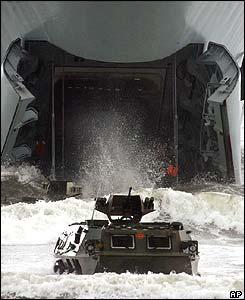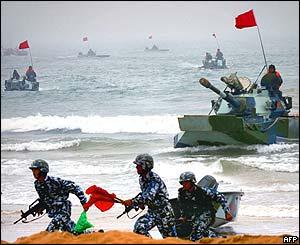by Abinyah Walker
This joint military exercise by these two countries is reported to strengthen military ties between the two regional powers. The joint operation is thought to express their desire to join the peace-keeping roles their western counterparts have enjoyed for over a decade. Missions that these two countries feel they need to be involved in to maintain a watchful eye on their global economic and strategic goals. They now fear US global military supremacy and strategic positioning around the globe. With more than 7,000 Chinese and nearly 2,000 Russian soldiers caught up in this exercise, it is only a sign of things to come. Both countries can benefit from joint operations, similar to ones performed by US and NATO allies in the Atlantic, in both strategic, war fighting and economic terms.
Economically, Russia is China’s main supplier of high-tech weaponry. Recently the transfer of fighter jet manufacturing to mainland China is a sample how deep their economic military alliance spans. China’s need to improve their military hardware to intimidate Taiwan into submission has not been going well because China needs to catch up technologically with Taiwan, who has access to advanced US military and strategic hardware. Along with the power game being played in relations to the ban on European weapon sales to China, the only option left for the Chinese is Russia and Israel.


China undoubtedly is prepared for a clash with Taiwan; however this may not happen without support or abstinence from other regional powers. Still China needs to practice amphibious landings similar to the one performed on the Shandong Peninsula during the war games. From a western standpoint the amphibious invasion of Taiwan seems the only like reason for such a test. Nonetheless high ranking military officers like Major General Pen Guanglian expresses their desires as a need to “frighten the three evil forces of 'ethnic separatism, religious extremism and international terrorism". Even though the Chinese mobilized destroyers, frigates, aircraft and submarines, along with Russian missile destroyers and anti-submarine vessels Washington did not send official observers. This can be interpreted in three ways: Washington may be un-impressed by military showboating and were pre-advised. They may see this exercise strictly as military window shopping for the Chinese. Or they may need to downplay the significance of the situation and observe their progress from space.
However it is more likely that all three reasons play a significant factor. The staging point of the operation in Vladivostok, Russia, has been well monitored by the US, Europe and Japan since before WWII. The meek deployment of vessels indicates that this is not a major joint effort, but a test bed for future operations. Even though the US has often brought attention to China’s military built-up it is only inevitable that China upgrades its military force; and with the US owing over 18 billion in Chinese goods they have the cash to pay for it. More importantly China and Russia need to solidify their military imports and exports in a new increasingly hostile world order. The US, United Kingdom and France (according to Nationmaster) still account for the largest in controlled global arms sales; Russia and China a distant 4th and 5th. Still, there is an increasing demand for new high-tech weapons. Israel now accounts for some 12% of global weapon sales, as a new trend in commercial defense and joint-ventures increase in a globalized economy where international terrorism aims to disrupt global trade. Russia and China need to cooperate more closely regional in terms of militarily and economically, since they do not have access to advanced US or European technology they must maintain their fighting effectiveness. They need to dominate their regional influences and find new ways of funding their military expertise and of using their existing trade relations.
Finally, after watching the sheer military dominance of the US and its allies globally in the war on terror, these former military powers have realized how far behind they are in global power projection. Regardless of the size of their military force, the technical precision and sheer conventional firepower of the Western powers has shaken the foundations of these Security Council members, and has shown the military independence of its members in flexing their muscle in diplomatically sticky situations. Both have also been recently been dealt internationally as Russia was forced to join NATO, while China cannot hope to compete militarily or invade the small island of Taiwan; both fundamental insults to their global efforts. Simultaneously the US and its allies have occupied both Afghanistan and Iraq, while situating their elite strike forces along both the Russian and Chinese borders in Georgia, Kyrgyzstan, Uzbekystan, and Afghanistan. Strategically the US policy of containment has been wholly effective, while their former Communist foes have been feeling the global pinch.